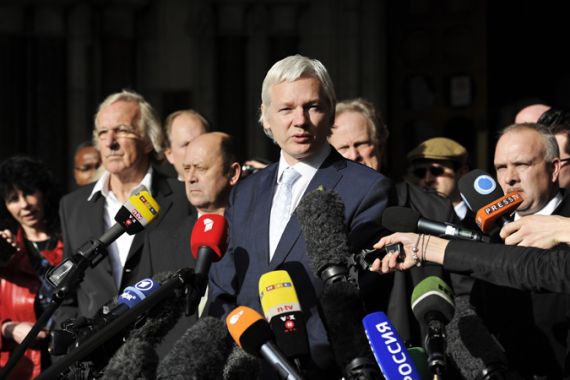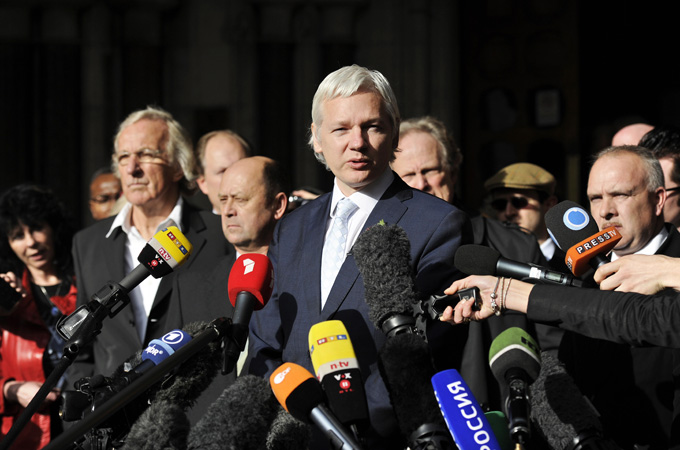WikiLeaks founder fights extradition
Julian Assange heads to UK court in bid to block his extradition to Sweden, where he faces allegations of sex crimes.

 |
| Julian Assange shot to fame when WikiLeaks released thousands of secret US diplomatic cables in 2010 [EPA] |
WikiLeaks founder Julian Assange appealed to Britain’s Supreme Court on Wednesday not to extradite him to Sweden over accusations of sex crimes, a move that could push his anti-secrecy website further towards oblivion.
The Australian-born Assange is expected to head to court on Wednesday for an expected two-day hearing on whether he should be sent back to Sweden to face the accusations.
He was detained in Britain in December 2010 on a European arrest warrant issued by a Swedish prosecutor after two female former WikiLeaks volunteers accused him of sexual assault.
| IN DEPTH | |||||||
|
His lawyers have argued that the warrant is invalid because it was issued by a prosecutor rather than a neutral judge or court.
A small group of demonstrators gathered outside the courthouse, braving a freezing morning to show support for Assange, who looked relaxed in a dark grey suit and purple tie as he entered court.
They carried banners with slogans such as “The system punishes whistleblowers to protect its own” and “Free Assange”.
“He speaks truth to power. He should be considered a national hero,” said Scott Albrecht, a former US soldier turned peace activist.
Assange, 40, denies any wrongdoing has said that the sex accusations, which surfaced at the height of the international furore over his whistle-blowing website, were an attempt to silence him.
If the supreme court rejects the argument, Assange could take his case to the European Court of Human Rights, although it is unclear whether that would stop the extradition process.
Assange gained recognition and infuriated the US government in 2010 when WikiLeaks released secret video footage and thousands of US diplomatic cables about the wars in Iraq and Afghanistan.
Denies any wrongdoing
His arrest came shortly after WikiLeaks published the secret diplomatic cables that included unflattering views of world leaders and candid assessments of security threats.
Assange says the allegations are politically motivated, and that US authorities are looking for a way to go after him in retaliation for WikiLeaks’ revelations.
Washington is divided over Assange, with some officials calling for tough action against him to deter would-be leakers. Others argue that a prosecution would be legally problematic and would give him a boost when he appears headed for irrelevance.
Bradley Manning, a US army intelligence analyst suspected of passing thousands of classified documents to WikiLeaks, is facing a court-martial on 22 charges including aiding the enemy and wrongfully causing intelligence to be published online.
US army investigators in December presented what they said was evidence for the first time in directly linking Manning to Assange.
The investigators told a US military hearing at an army base in Maryland that contact information for Assange was found on a computer hard drive belonging to Manning.
Assange has consistently denied knowing the source of the material received by his site but has expressed support for Manning.
